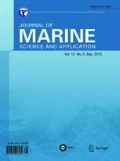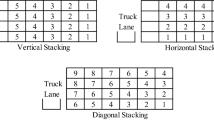Abstract
Secure storage yard is one of the optimal core goals of container transportation; thus, making the necessary storage arrangements has become the most crucial part of the container terminal management systems (CTMS). This paper investigates a random hybrid stacking algorithm (RHSA) for outbound containers that randomly enter the yard. In the first stage of RHSA, the distribution among blocks was analyzed with respect to the utilization ratio. In the second stage, the optimization of bay configuration was carried out by using the hybrid genetic algorithm. Moreover, an experiment was performed to test the RHSA. The results show that the explored algorithm is useful to increase the efficiency.
Similar content being viewed by others
References
Bazzazi M, Safaei N, Javadian N (2009). A genetic algorithm to solve the storage space allocation problem in a container terminal. Computers & Industrial Engineering, 56(1), 44–52.
Chen Lu, Lu Zhiqiang (2012). The storage location assignment problem for outbound containers in a maritime terminal. Int. J. Production Economics, 135(1), 73–80.
Dekker R, Voogd P, van Asperen E (2006). Advanced methods for container stacking. OR Spectrum, 28(4), 563–586.
Gen M, Lin L (2005). Priority-based genetic algorithm for shortest path routing problem in OSPF. Genetic and Evolutionary Computation Conference, Washington, D.C., USA.
Hao Jumin, Ji Zhuoshang, Lin Yan (2000). Study of optimization of a BAY of stacking. Journal of Dalian University of Technology, 40(1), 102–105.
Hou CX (2011). Research on the space allocation of container terminal export carton yard. Master thesis, Dalian Maritime University, Dalian.
Kang J, Ryu KR, Kim KH (2006). Deriving stacking strategies for export containers with uncertain weight information. Journal of Intelligent Manufacturing, 17(4), 399–410.
Kim KH, Kim KY (2007). Optimal price schedules for storage of inbound containers. Transportation Research Part B, 41(8), 892–905.
Kim KH, Park KT (2003). A note on a dynamic space-allocation method for outbound containers. European Journal of Operational Research, 148(1), 92–101.
Rodriguez-Molins M, Salido MA, Barber F (2012). Intelligent planning for allocating containers in maritime terminals. Expert Systems with Applications, 39(1), 978–989.
Salido MA, Rodriguez-Molins M, Barber F (2011). Integrated intelligent techniques for remarshaling and berthing in maritime terminals at marine terminals. Advanced Engineering Informatics, 25(3), 435–451.
Saurí S, Martín E (2011). Space allocating strategies for improving import yard performance. Transportation Research Part E, 47(6), 1038–1057.
Wang B (2007). Dynamic and Stochastic storage model in a container yard. Systems Engineering-Theory & Practice, 4, 147–153.
Wang MC (2007). Research on dynamic slot allocation strategy optimization in container terminal yards. Master thesis, Wuhan University of Technology, Wuhan.
Yi Zhengjun, Jiang Jing, Hu Yong (2011). An optimization control algorithm for containers relocation based on PCNN model. Acta Auto Maticasinica, 37(2), 241–244.
Zhang C, Liu J, Wan YW, Murty KG, Linn RJ (2003). Storage space allocation in container terminals. Transportation Research Part B, 37(10), 883–903.
Author information
Authors and Affiliations
Corresponding author
Additional information
Foundation item: Supported by the Research Grants from Shanghai Municipal Natural Science Foundation (No. 10190502500), Shanghai Maritime University Start-up Funds, Shanghai Science & Technology Commission Projects (No. 09DZ2250400), and Shanghai Education Commission Project (No. J50604).
Meilong Le professor, PhD supervisor. Serve as the vice president of Scientific Research in Shanghai Maritime University. He served as the vice present of Logistics Institute of China and the United States in 2005, evaluation experts of 863 and 973 projects. He majors in supply chain management of container port and airline operations and scheduling.
Rights and permissions
About this article
Cite this article
Le, M., Yu, H. The RHSA strategy for the allocation of outbound containers based on the hybrid genetic algorithm. J. Marine. Sci. Appl. 12, 344–350 (2013). https://doi.org/10.1007/s11804-013-1200-3
Received:
Accepted:
Published:
Issue Date:
DOI: https://doi.org/10.1007/s11804-013-1200-3




